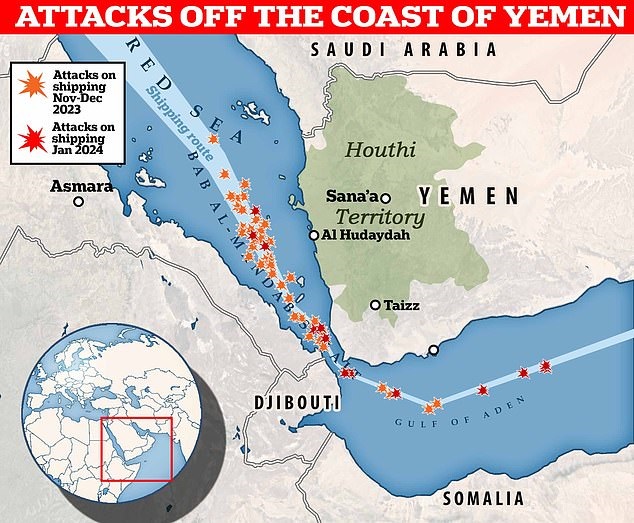Yemen's Houthi rebels claim to have a new, hypersonic missile in their arsenal, Russia's state media reported Thursday, potentially raising the stakes in their ongoing attacks on shipping in the Red Sea and surrounding waterways against the backdrop of Israel's war on Hamas in the Gaza Strip, ABC news informs.
However, the Houthis have for weeks hinted about “surprises” they plan for the battles at sea to counter the United States and its allies, which have so far been able to down any missile or bomb-carrying drone that comes near their warships in Mideast waters.
Iran, the Houthis' main benefactor, claims to have a hypersonic missile and has widely armed the rebels with the missiles they now use. Adding a hypersonic missile to their arsenal could pose a more formidable challenge to the air defense systems employed by America and its allies, including Israel.
“The group’s missile forces have successfully tested a missile that is capable of reaching speeds of up to Mach 8 and runs on solid fuel," a military official close to the Houthis said, according to the RIA report. The Houthis “intend to begin manufacturing it for use during attacks in the Red Sea and the Gulf of Aden, as well as against targets in Israel.”
Hypersonic weapons, which fly at speeds higher than Mach 5, could pose crucial challenges to missile defense systems because of their speed and maneuverability.
Ballistic missiles fly on a trajectory in which anti-missile systems like the U.S.-made Patriot can anticipate their path and intercept them. The more irregular the missile’s flight path, such as a hypersonic missile with the ability to change directions, the more difficult it becomes to intercept.
China is believed to be pursuing the weapons, as is America. Russia claims it has already used them.
In Yemen, Abdul Malik al-Houthi, the Houthi rebels' secretive supreme leader, boasted about the rebels' weapons efforts at the end of February, saying: “We have surprises that the enemies do not expect at all."
A week ago, he similarly warned: “What is coming is greater.”
“The enemy ... will see the level of achievements of strategic importance that place our country in its capabilities among the limited and numbered countries in this world,” al-Houthi said, without elaborating.
Israel's military — which also has come under Houthi fire since the war against Hamas erupted on Oct. 7 when Hamas-led militants attacked Israel, killing 1,200 people and taking 250 others hostage — declined to comment.
Also Thursday, The Financial Times reported that the U.S. and Iran held indirect talks in Oman in January that America hoped would curtail the Red Sea attacks. The last known round of such talks had come last May.
The U.S. State Department did not deny the January talks took place in a statement to The Associated Press, saying: “We have many channels for passing messages to Iran.”

In the wake of the barbaric attack on Israel by Hamas on October 7, Iran's role as the leading state sponsor of terror has come under international spotlight. US officials held backchannel talks with their Iranian counterparts in January to discuss a litany of issues including the rogue state's nuclear program and the ongoing attacks by Tehran-backed Houthi rebels in the Red Sea, writes The Daily Mail.
Persistent Houthi attacks have already disrupted traffic in the crucial waterway for cargo and energy shipments moving from Asia and the Middle East to Europe. Already, many ships have turned away from the route.
The talks were the first held between the two nations since 2023. They took place in Oman in the presence of interlockers, reports the Financial Times.
The US delegation led by White House Middle East advisor Brett McGurk and Iranian envoy Abram Paley. They were faced off against Iranian deputy foreign minister Ali Bagheri Kani, considered a top official in the country's nuclear program.
Messages between the two groups were 'shuttled' by representatives from Oman, according to the FT report.
The Biden administration has long spoken of its desire not to see Israel's retaliation in Gaza spill over into an all-out regional conflict.
A source told the FT that keeping communications open with Tehran is 'a method for raising the full range of threats... what they need to do in order to prevent a wider conflict, as they claim to want.'
In response to the report, the State Department issued a statement confirming that messages are exchanged between the Biden administration and Iran.
An Iranian official told the FT that their government provides 'spiritual' influence over the Houthis but they are ultimately independent.
Despite western reporting on the talks, the Iranian state media has said that the message were solely about lifting US-imposed sanctions on Iran.
In February, Iran withdrew senior commanders from Syria as the US plotted a response to the killing three of its soldiers in a drone attack that injured more than 40 others.
The Houthis insist their attacks will continue until Israel stops its combat operations in the Gaza Strip, which have enraged the wider Arab world and seen the Houthis gain international recognition.
read more in our Telegram-channel https://t.me/The_International_Affairs

 10:44 17.03.2024 •
10:44 17.03.2024 •























